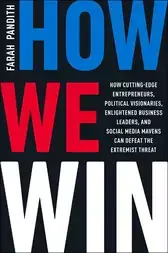Farah Pandith is an adjunct senior fellow at the Council on Foreign Relations, foreign policy strategist, and former diplomat. Pandith, a pioneer in the field of countering violent extremism (CVE), has been a political appointee in the George H.W. Bush, George W. Bush, and Barack Obama administrations. She left government in early 2014 for Harvard University’s Kennedy School of Government, where she maintains an affiliation. She served on the secretary of homeland security’s Homeland Security Advisory Council (HSAC) from 2015 to 2017, where she also chaired the HSAC subcommittee on countering violent extremism and delivered a report in June 2016. Her book, How We Win: How Cutting-Edge Entrepreneurs, Political Visionaries, Enlightened Business Leaders, and Social Media Mavens Can Defeat the Extremist Threat, was published in 2019. Pandith is also a public speaker and global advisor, driving efforts to counter extremism through new programs and initiatives. She was a senior advisor and commissioner on the Center for Strategic and International Studies' CVE Commission Report and is a senior advisor at the Anti-Defamation League (ADL). The Muhammad Ali Center named Pandith the first-ever Muhammad Ali Global Peace Laureate for her proven track record of and commitment to promoting diversity, cohesion, and respect.
Pandith was appointed the first special representative to Muslim communities in June 2009 by Secretary of State Hillary Rodham Clinton, serving under both Clinton and John Kerry. Her office was responsible for executing a vision for engagement with Muslims around the world on a people-to-people and organizational level. During her tenure, Pandith traveled to nearly one hundred countries and launched youth-focused initiatives. She was also the main architect of the Women in Public Service Project. In January 2013, she was awarded the Secretary's Distinguished Honor Award.
Previously, Pandith was senior advisor to the assistant secretary of state for European and Eurasian affairs, a role created for her in the context of the Danish cartoon controversy. She built new State Department strategies for how U.S. embassies in Europe could understand the Muslim demographic and the increase in foreign ideologies present on the ground, and how the United States could build resilience.
From 2004 to 2007, Pandith served as director for Middle East regional initiatives for the National Security Council (NSC). Before joining the NSC, Pandith was chief of staff of the Bureau for Asia and the Near East for the U.S. Agency for International Development (USAID). In 2004, she spent two months in Afghanistan developing a public outreach strategy. She also served at USAID from 1990 to 1993 on the administrator’s staff and as the special assistant to the director of policy. From 1997 to 2003, Pandith was vice president of international business for ML Strategies and served as a commissioner on Governor Paul A. Cellucci’s bipartisan Asian Advisory Commission.
Pandith is a consultant in the public, private, and nonprofit sectors and serves in leadership positions on several boards with a focus on international affairs, women’s empowerment, education, and cultural diplomacy, including Mercy Corps, the Excellerate Foundation, the Institute for Strategic Dialogue, and the We Are Family Foundation. She also serves on the advisory boards for the Asian American Foundation, America Abroad Media, The National Security Initiative (NSI), the Council for Responsible Social Media, and the Aspen Institute and ADL's Civil Society Fellowship. She formerly served on the boards of Tufts University Fletcher School of Law and Diplomacy, the Tribeca Film Institute, and the Women in Public Service Project.
Pandith received an AB in government and psychology from Smith College and a master’s degree from the Fletcher School of Law and Diplomacy, where she specialized in international security studies, Islamic civilizations and southwest Asia, and international negotiation and conflict resolution. She was awarded the Smith College Medal in 2014 and the Distinguished Achievement Award by Tufts University in 2013. She holds honorary doctorates from Mount Saint Mary’s University and Tufts University.
 Online Store
Online Store


